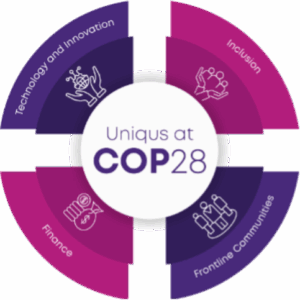1. https://www.cop28.com/en/letter-to-parties
Building Upon COP27
What was decided at COP27?
At last year’s COP27, world leaders gathered in Sharm el-Sheikh, Egypt to regain trust in multilateralism (i.e., international cooperation), and agreed on a plan to tackle the most significant and urgent challenges of our time, as the world bears the grunt of climate disruption and its collateral damages.
Parties at COP27 agreed on five key takeaways:
- To establish a dedicated fund for loss and damage
- To maintain a clear intention for keeping 1.5°C within reach
- To hold businesses and institutions accountable
- To mobilize additional financial support for developing countries
- To make a shift towards implementation
Establish a dedicated fund for loss and damage3
A breakthrough agreement on providing loss and damage financing for vulnerable countries struck by floods, droughts or other climate disasters was reached at the end of COP27.
According to UN Climate Change Executive Secretary, Simon Stiell, “This outcome does move us forward . . . We have determined a way forward on a decades-long conversation on funding for loss and damage – deliberating over how we address the impacts on communities whose lives and livelihoods have been ruined by the very worst impacts of climate change.”
Earlier in November 2023, a consensus of 24 countries negotiated a voluntary agreement to contribute to such a fund, to be housed by the World Bank2. The proposal is expected to be further debated, finalized, and adopted at COP28.
Maintain a clear intention for keeping 1.5°C within reach
According to the IPCC, limiting warming to less than 1.5°C will reasonably require global greenhouse gas emissions to peak by 2025 at the latest and decrease by 43% compared to a 2019 baseline by 20303. This gives the world just a seven-year window from now. Presently, global efforts to meet the 1.5°C objective are lagging. The UN’s Climate Change report highlights that, by the end of the century, the world will be 2.5 to 2.9 °C4 warmer than pre-industrial levels despite existing commitments made by national governments.
COP28 will require countries to evaluate their current progress towards achieving the goals set out by the Paris Accords through the GST process and COP28 programming. COP28 is expected to result in renewed commitments from governments to implement plans for climate action, which will keep the world on track to limit warming to under 1.5°C over the next seven years.
2. https://www.reuters.com/sustainability/cop/tensions-soar-over-new-fund-climate-loss-damage-ahead- cop28-2023-10-23/
Hold businesses and institutions accountable
All stakeholders at COP27 – including sectors, enterprises, and institutions – undertook commitments in accordance with this new phase of implementation. Market actors will need to maintain transparency across these commitments and focus on accountability moving forward.
COP28 will continue this inclusion of businesses. To be successful, COP28 outcomes will need to include adequate mechanisms for accountability and scrutiny, and not just inclusion, of market stakeholders.
Mobilize additional financial support for developing countries
Sufficient funds will be required to mitigate climate change, mobilize loss and damage, and implement climate technologies. COP27’s cover decision,
known as the Sharm el-Sheikh Implementation Plan, envisions an investment of at least USD 4-6 trillion per year to transform the world into a low carbon
economy. This financing will need to be done quickly and comprehensively, involving governments, central banks, commercial banks, funding institutions
as well as other custodians of capital.
The call for developed countries to provide financial resources to replenish the Green Climate Fund is one of the most important outcomes from various
decisions on climate finance. The current annual adaptation finance gap by 2030 is about USD 194-366 billion5. That said the Adaptation Fund is growing
significantly and now has a total commitment over USD 1 billion6 on 160 concrete adaptation projects catering to 41 million most vulnerable beneficiaries
in developing countries.million and the Specific Climate Change Fund totaling USD 35.0 million, have been approved by all parties7.
The UNFCCC’s Standing Committee on Finance has prepared a report on the doubling adaptation finance and a biennial progress report on the goal to
achieve USD 100 billion per year to address the climate action needs of developing countries starting in 2024, which will both be discussed at COP28.
3. https://unfccc.int/maintaining-a-clear-intention-to-keep-15degc-within-reach
4. https://www.unep.org/resources/emissions-gap-report-2023
5. https://www.unep.org/resources/adaptation-gap-report-2022
6. https://www.adaptation-fund.org/cop28/
Make a shift towards implementation
Implementation is an increasingly necessary element espoused throughout the suite of decisions adopted at COP27, aiming to strengthen nations’ action towards reducing emissions and adapting to unavoidable climate change impacts. Significantly, nations resolved to make the climate change transition not only ambitious, but also just and equitable. At COP27, parties deciding to establish a Work Programme on ‘Just Transition’ that is expected to build upon and complement the work already underway to quickly scale up mitigation ambition and implementation.
Programming at COP28 will have a renewed focus on implementation of climate action as well. As Simon Stiell mentioned, “The heart of implementation is: Everybody, everywhere in the world, every single day, doing everything they possibly can to address the climate crisis.”
7. https://unfccc.int/process-and-meetings/conferences/sharm-el-sheikh-climate-change-conference- november-2022/five-key-takeaways-from-cop27/mobilizing-more-financial-support-for-developing-countries
8. https://unfccc.int/making-the-pivot-toward-implementation
Uniqus’ Expectations for COP28
What are the focus areas for COP28?
Both COP27 and COP28 share a marked similarity, as both are hosted in the Middle East and North Africa (MENA) region, resulting in increased cooperation across the region’s broader climate ambitions.
At COP28, the Presidency has announced four cross-cutting themes in its thematic days programming which underpin effective, interconnected delivery and highlight subjects raised by stakeholders:

Following the World Climate Action Summit, these themes will be the focus of the summit programming on the days of the event.
Uniqus: Keeping these themes in mind and mapping them with the outcomes from Sharm el-Sheikh, it is a collective responsibility of attendees to COP28 to mobilize funds and actions from local, national, and international sources as a matter of priority.
01. Technology and innovation: How will nations identify, innovate, and invest in the proper green technologies to drive climate action?






